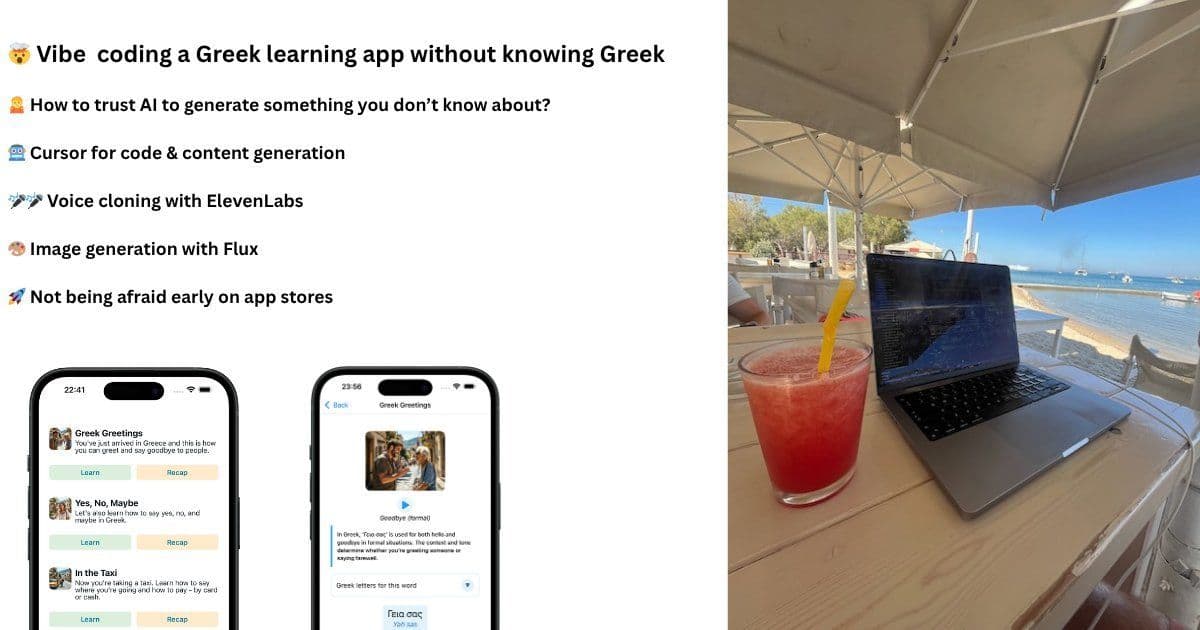When language apps failed him, developer Mike Borozdin leveraged AI tools like Claude, Cursor, and ElevenLabs to create his own Greek learning app in weeks. His journey reveals the practical realities—and surprising pitfalls—of using generative AI for rapid development, from voice cloning to app store approvals.
As a frequent traveler, Mike Borozdin relies on apps like Busuu or Babbel to learn languages before trips—tools he praises for their focus on grammar and cultural context. But when planning a three-week trip to Greece, he hit a wall: no major app supported Greek. After testing alternatives, he did what any resourceful engineer would—he built his own. "A classic engineer, eh?" Borozdin quipped in his blog post. What followed was a crash course in AI-assisted development, blending coding, content generation, and real-world testing into a functional app called Serious Greek.
The AI Copilot: Coding and Content Generation
Borozdin, a Russian native fluent in English and Italian, faced a core challenge: building an app for a language he didn’t know. He turned to Claude (via the Cursor IDE) to generate both code and lessons. Cursor’s AI capabilities accelerated development, especially after creating reusable rule files. "Cursor performed even better when I finally bothered to write a rule file instead of prompting," he noted. Still, AI wasn’t flawless. For Greek verbs, Claude omitted pronouns (e.g., "πάω" instead of "Εγώ πάω" for "I go"), requiring explicit prompting to align with beginner needs. Borozdin emphasized: "When I'm starting to learn a brand new language, I do want my pronouns."
Content generation pushed AI further. For audio, ElevenLabs cloned a friend’s voice using just 12 minutes of English recordings—then synthesized Greek speech from it. "It wasn’t perfect, but it was definitely recognizable," Borozdin marveled. Images proved trickier. Flux (an AI image tool) struggled with simple requests like thumbs-down gestures for "Όχι" ("no"), forcing compromises. Borozdin and Claude co-wrote scripts to batch-generate these assets, refining prompts to avoid "cheesy" outputs and ensure cultural relevance.
Technical Stack and Deployment Lessons
The app used React Native with Expo for cross-platform efficiency, a choice Borozdin endorsed for its streamlined app store submissions. Expo’s CLI handled builds and updates, though Google Play initially rejected the app over a reused privacy policy link. Surprisingly, Apple approved it on the first try—a first for Borozdin. "I was beyond ecstatic! That had never happened in my life before!" Yet, discovery remained a hurdle: "No-one will find your little app... Without any marketing, no-one will notice."
Why This Matters for Developers
Borozdin’s project underscores AI’s dual role in modern development: a powerful accelerant with glaring limitations. Tools like Cursor and ElevenLabs enable rapid prototyping, but human oversight is non-negotiable—whether debugging Greek greetings (e.g., correcting "αδιό σας" to the common "Γειά σας") or curating AI outputs. For indie developers, it demonstrates how personal frustrations can fuel innovation, though Borozdin’s struggles with Flux and app store visibility highlight that AI doesn’t eliminate grind. As he put it, "It's never build and they will come." His experience is a microcosm of a broader shift: AI is reshaping not just how we code, but how we create and validate user-facing content—demanding both technical skill and editorial judgment.
—Source: Mike Borozdin’s blog

Comments
Please log in or register to join the discussion